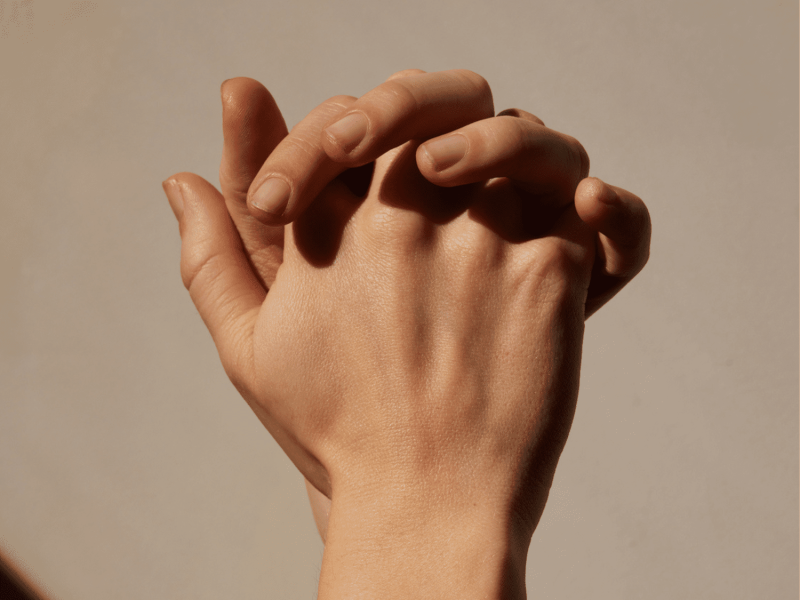Close

Treatment
Cracked, callused, dry hands can be annoying, not to mention downright uncomfortable at times. But if your hands are full-on peeling, that can open up a whole new set of issues. Further complicating matters, a surprising number of factors, including lifestyle, environment, and conditions, can cause peeling hands. Spoiler alert—it’s not always just a symptom of skin dryness, as many people suspect.
But don't fret: you've got options. Here, board-certified dermatologists Geeta Yadav, MD, and Kiran Mian, MD, outline some of the reasons your hands may be peeling, the best ways to prevent peeling in the first place, and what you can do to alleviate the issue.
Keep reading to learn how you can stop your hands from peeling.
Why Are Your Hands Peeling?
The high-level summary is that peeling is most often a result of either dryness, excess moisture, or a skin condition.
- Dryness: As far as dryness goes, “When the skin barrier isn’t working properly, moisture can easily escape the skin while irritants can enter it, causing reactivity and irritation, including chapping and peeling,” explains Yadav. Cold, dry weather can lead to a compromised skin barrier, as can overwashing. “In this day and age, post-COVID, the greatest cause of peeling hands is excessive hand washing and sanitizing,” says Yadav. “The harsh ingredients in antibacterial formulas, as well as stripping the skin of its natural oils with frequent cleansing, can cause hands to peel and crack.”
- Excess moisture: On the flip side, too much moisture—more specifically, sweat—can also cause peeling (particularly on your palms). “Hands perspire, which can cause maceration,” says Mian. Maceration is a softening and breakdown of the skin that occurs when it’s moist for prolonged periods; this can ultimately result in it peeling off. Yadav notes that the palms of the hands have a higher density of sweat glands than elsewhere on the body, so excessive sweating is frequent here. In related news, there’s also a condition known as kertolysis exfoliativa: “This is a condition where the palms (and sometimes the soles of the feet) peel in these thin circles,” explains Yadav. “It can be aggravated by soaps, irritants, and sweaty palms, which is why it can worsen in the summer.”
- Skin conditions: Regarding skin conditions, eczema and psoriasis can also lead to peeling hands. These are both inflammatory conditions, characterized by peeling, flaking, and often raw skin—which are all, you guessed it, signs of barrier dysfunction, Yadav tells us. Fungal infections can also cause peeling; we use our hands to put on our shoes, which can cause the transfer of foot fungus to the hands, known as “two foot, one hand syndrome,” says Mian.
How to Prevent Peeling Hands
Your hands are constantly exposed and subjected to the elements, notes Mian, so anything you can do to help shield them from the air, harsh chemicals, etc., will help immensely. Wear gloves in the winter (or when taking on tasks like cleaning your house or washing dishes), and only use gentle, moisturizing hand soaps.
Besides that, the best thing you can do is ensure you’re moisturizing, moisturizing, and moisturizing some more. “Use hand cream several times a day and consider sleeping with a pair of cotton gloves on your hands, too, which will seal in the nourishment from your hand cream so you can wake up to super soft and smooth hands,” recommends Yadav. Mian adds that using a formula with ceramides—an essential ingredient for maintaining a strong and healthy skin barrier—is ideal.
How to Treat Peeling Hands
Again, focusing on moisturizing is imperative, but “if your hands are lightly peeling, you can try using a gentle exfoliant, like a mild face scrub, every few days to help slough off the dead skin,” says Yadav. Mian suggests using a cream that contains urea, a keratolytic ingredient that helps break apart dead skin cells.
Still, both derms we spoke with underscore the importance of seeing your doctor to diagnose what’s causing the peeling and formulate an effective treatment plan. This is especially paramount if you’re dealing with an underlying skin condition such as eczema or psoriasis or have excessively sweaty palms; you might need to look into prescription medications. For sweaty palms, Yadav tells us that Botox injections can also be very helpful.


